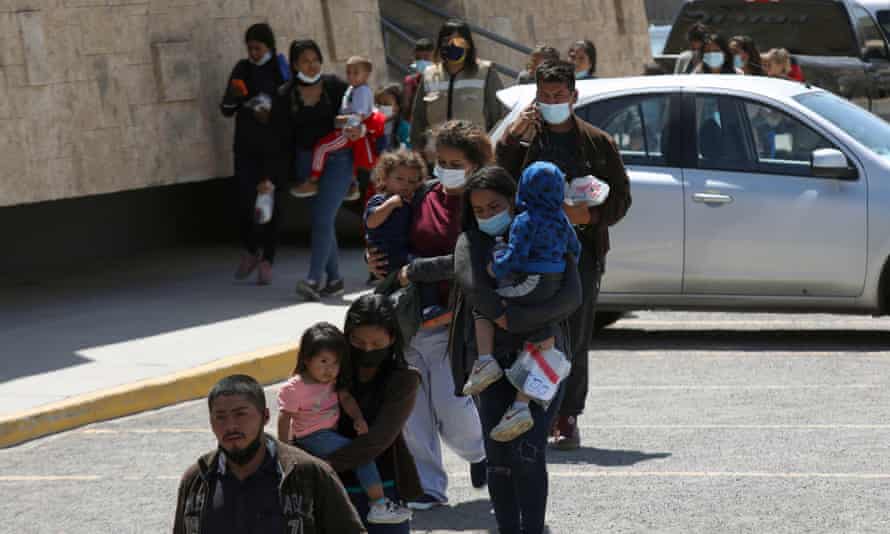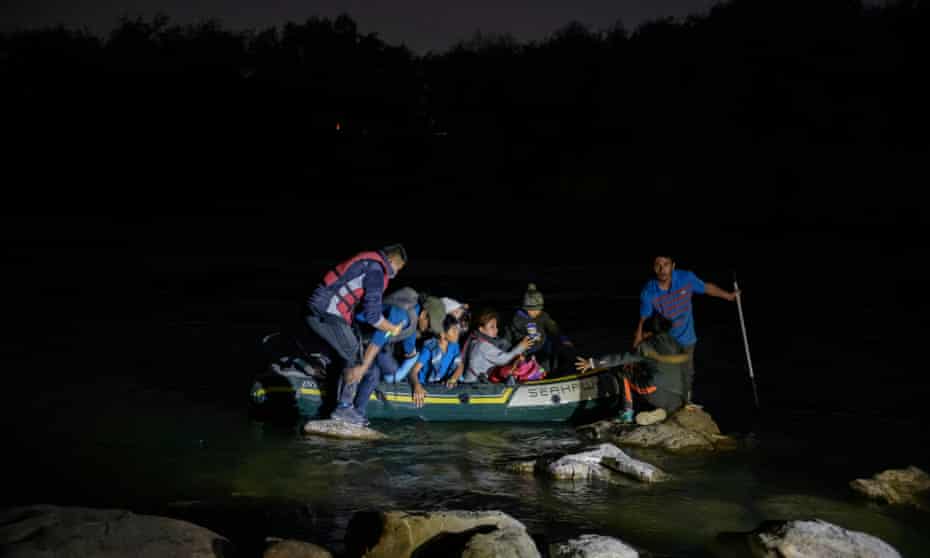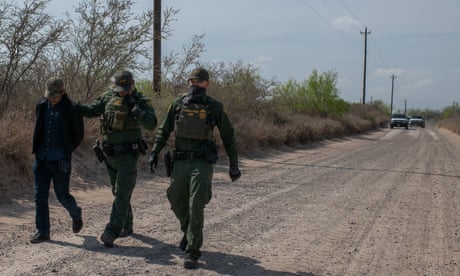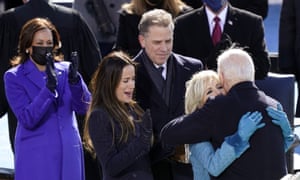"Two Pesos Pobres" is a song that I wrote and dedicated to the undocumented farm workers from Mexico who put their lives on the line and food on American tables every day.
Here is a video of Jen's and my performance at the AFOP (Association of Farmworker Opportunity Programs ) conference in New Orleans, 12/2010.
Friday, November 26, 2021
"Two Pesos Pobres (Y Más Peor)" Original Music Dedicated to Undocumented Farmworkers From Mexico
Sorry about the apparent extra step: cut and paste
Hopelessly poor, in a desperate land, houses of pallets, they do what they can
They are Two Pesos Pobres, y más peor, South of the border they struggle for more,
Two Pesos Pobres, y más peor,
Two Pesos Pobres, y más peor,
Gracias a los trabajadores!
Saturday, April 10, 2021
Why Won't This Illegal Immigration Interview with Harsha Walia Be Discussed In American Politics? Because It Is The Truth
https://www.theguardian.com/world/2021/apr/07/us-border-immigration-harsha-walia
As a retired US Border Patrol/ICE agent (26 years) I say this immigration article by Lois Beckett in "The Guardian" is one of the most accurate and truthful articles I have ever read concerning illegal immigration.
You won't hear much about the points made in this article in American news or politics. Why? Washington is not interested in Americans knowing the truth, especially about illegal immigration. Many, many political careers have been made off of the Republican's rhetoric of "build a wall, boot 'em out" to the Democratic rhetoric "let 'em have a chance".
Yet despite all of the back in forth propaganda I have seen in my sixteen years of retirement and twenty-six years of service, very little if anything actually changes when it come to illegal immigration.
Sure, amnesty and DACA here, border wall and immigration surges there - but overall, the pattern remains the same. US corporations profit off of the system remaining the same. There is profit to be made off of illegal labor. There is profit to be made off of whole border enforcement industrial complex that never quite gets the job done. Just like the "war on drugs" no?
‘A system of global apartheid’: author Harsha Walia on why the border crisis is a myth
The Canadian organizer says the actual crises are capitalism, war and the climate emergency, which drive mass migration
The rising number of migrant children and families seeking to cross the US border with Mexico is emerging as one of the most serious political challenges for Joe Biden’s new administration.
That’s exactly what Donald Trump wants: he and other Republicans believe that Americans’ concerns about a supposed “border crisis” will help Republicans win back political power.
But Harsha Walia, the author of two books about border politics, argues that there is no “border crisis,” in the United States or anywhere else. Instead, there are the “actual crises” that drive mass migration – such as capitalism, war and the climate emergency – and “imagined crises” at political borders, which are used to justify further border securitization and violence.
Walia, a Canadian organizer who helped found No One Is Illegal, which advocates for migrants, refugees and undocumented people, talked to the Guardian about Border and Rule, her new book on global migration, border politics and the rise of what she calls “racist nationalism.” The conversation has been edited for length and clarity.
Last month, a young white
gunman was charged with murdering eight people, most of them Asian
women, at several spas around Atlanta, Georgia. Around the same time,
there was increasing political attention to the higher numbers of
migrants and refugees showing up at the US-Mexico border. Do you see any connection between these different events?
I think they are deeply connected. The newest invocation of a “border surge” and a “border crisis” is again creating the spectre of immigrants and refugees “taking over.” This seemingly race neutral language – we are told there’s nothing inherently racist about saying “border surge”– is actually deeply racially coded. It invokes a flood of black and brown people taking over a so-called white man’s country. That is the basis of historic immigrant exclusion, both anti-Asian exclusion in the 19th century, which very explicitly excluded Chinese laborers and especially Chinese women presumed to be sex workers, and anti-Latinx exclusion. If we were to think about one situation as anti-Asian racism and one as anti-Latinx racism, they might seem disconnected. But both forms of racism are fundamentally anti-immigrant. Racial violence is connected to the idea of who belongs and who doesn’t. Whose humanity is questioned in a moment of crisis. Who is scapegoated in a moment of crisis.
How do you understand the rise of white supremacist violence, particularly anti-immigrant and anti-Muslim violence, that we are seeing around the world?
The rise in white supremacy is a feedback loop between individual rightwing vigilantes and state rhetoric and state policy. When it comes to the Georgia shootings, we can’t ignore the fact that the criminalization of sex work makes sex workers targets. It’s not sex work itself, it’s the social condition of criminalization that creates that vulnerability. It’s similar to the ways in which border vigilantes have targeted immigrants: the Minutemen who show up at the border and harass migrants, or the kidnapping of migrants by the United Constitutional Patriots at gunpoint. We can’t dissociate that kind of violence from state policies that vilify migrants and refugees, or newspapers that continue to use the word “illegal alien”.

National borders are often described as protecting citizens, or as protecting workers at home from lower-paid workers in other countries. You argue that borders actually serve a very different purpose.
Borders maintain a massive system of global apartheid. They are preventing, on a scale we’ve never seen before, the free movement of people who are trying to search for a better life.
There’s been a lot of emphasis on the ways in which Donald Trump was enacting very exclusionary immigration policies. But border securitization and border controls have been bipartisan practices in the United States. We saw the first policies of militarization at the border with Mexico under Bill Clinton in the late 90s.
In the European context, the death of [three-year-old Syrian toddler] Alan Kurdi, all of these images of migrants drowning in the Mediterranean, didn’t actually lead to an immigration policy that was more welcoming. Billions of euros are going to drones in the Mediterranean, war ships in the Mediterranean. We’re seeing the EU making trade and aid agreements it has with countries in the Sahel region of Africa and the Middle East contingent on migration control. They are relying on countries in the global south as the frontiers of border militarization. All of this is really a crisis of immobility. The whole world is increasingly becoming fortified.
What are the root causes of these ‘migration crises’? Why is this happening?
What we need to understand is that migration is a form of reparations. Migration is an accounting for global violence. It’s not a coincidence that the vast number of people who are migrants and refugees in the world today are black and brown people from poor countries that have been made poor because of centuries of imperialism, of empire, of exploitation and deliberate underdevelopment. It’s those same fault lines of plunder around the world that are the fault lines of migration. More and more people are being forced out of their land because of trade agreements, mining extraction, deforestation, climate change. Iraq and Afghanistan have been for decades on the top of the UN list for displaced people and that has been linked to the US and Nato’s occupations of those countries.
Why would governments have any interest in violence at borders? Why spend so much money on security and militarization?
The border does not only serve to exclude immigrants and refugees, but also to create conditions of hyper exploitation, where some immigrants and refugees do enter, but in a situation of extreme precarity. If you’re undocumented, you will work for less than minimum wage. If you attempt to unionize, you will face the threat of deportation. You will not feel you can access public services, or in some cases you will be denied public services. Borders maintain racial citizenship and create a pool of hyper-exploitable cheapened labor. People who are never a full part of the community, always living in fear, constantly on guard.
Why do you choose to put your focus on governments and their policies, rather than narratives of migrants themselves?
Border deaths are presented as passive occurrences, as if people just happen to die, as if there’s something inherently dangerous about being on the move, which we know is not the case. Many people move with immense privilege, even luxury. It’s more accurate to call what is happening to migrants and refugees around the world as border killings. People are being killed by policies that are intended to kill. Literally, governments are hoping people will die, are deliberating creating conditions of death, in order to create deterrence.
It is very important to hold the states accountable, instead of narratives where migrants are blamed for their own deaths: ‘They knew it was going to be dangerous, why did they move?’ Which to me mimics the very horrible tropes of survivors in rape culture.

You live in Canada. Especially in the United States, many people think of Canada as this inherently nice place. Less racist, less violent, more supportive of refugees and immigrants. Is that the reality?
It’s totally false. Part of the incentive of writing this second book was being on a book tour in the US and constantly hearing, ‘At least in Canada it can’t be as bad as in the US.’ ‘Your prime minister says refugees are welcome.’ That masks the violence of how unfree the conditions of migration are, with the temporary foreign worker program, which is a form of indentureship. Workers are forced to live in the home of their employer, if you’re a domestic worker, or forced to live in a labor camp, crammed with hundreds of people. When your labor is no longer needed, you’re deported, often with your wages unpaid. There is nothing nice about it. It just means Canada has perfected a model of exploitation. The US and other countries in Europe are increasingly looking to this model, because it works perfectly to serve both the state and capital interests. Capital wants cheapened labor and the state doesn’t want people with full citizenship rights.
You wrote recently that ‘Escalating white supremacy cannot be dealt with through anti-terror or hate crime laws.’ Why?
Terrorism is not a colorblind phenomena. The global war on terror for the past 20 years was predicated around deeply Islamophobic rhetoric that has had devastating impact on Black and Brown Muslims and Muslim-majority countries around the world. I think it is implausible and naive to assume that the national security infrastructure, or the criminal legal system, which is also built on racialized logics, especially anti-black racism – that we can somehow subvert these systems to protect racialized communities. It’s not going to work.
One of the things that happened when the Proud Boys were designated as a terrorist organization in Canada is that it provided cover to expand this terror list that communities have been fighting against for decades. On the day the Proud Boys were listed, a number of other organizations were added which were part of the Muslim community. That was the concern that many of us had: will this just become an excuse to expand the terrorist list rather than dismantle it? In the long run, what’s going to happen? Even if in some miraculous world the Proud Boys and its members are dismantled, what’s going to happen to all the other organizations on the list? They’re still being criminalized, they’re still being terrorized, they’re still being surveilled.
So if you don’t think the logics of national security or criminal justice will work, what do you think should be done about escalating white supremacist violence?
I think that’s the question: what do we need to be doing? It’s not about one arm of the state, it’s about all of us. What’s happening in our neighborhoods, in our school systems, in the media? There’s not one simple fix. We need to keep each other safe. We need to make sure we’re intervening whenever we see racial violence, everything from not letting racist jokes off the hook to fighting for systemic change. Anti-war work is racial justice work. Anti-capitalist work is racial justice work.
You advocate for ending border imperialism, and ending racial capitalism. Those are big goals. How do you break that down into things that one person can actually do?
I actually found it harder before, because I would try things that I thought were simple and would change the world, and they wouldn’t. For me, understanding how violences are connected, and really understanding the immensity of the problem, was less overwhelming. It motivated me to think in bigger ways, to organize with other people. To understand this is fundamentally about radical, massive collective action. It can’t rely on one person or even one place.
... we have a small favour to ask. You’ve read
in the last year. And you’re not alone; through these turbulent and challenging times, millions rely on the Guardian for independent journalism that stands for truth and integrity. Readers chose to support us financially more than 1.5 million times in 2020, joining existing supporters in 180 countries.
With your help, we will continue to provide high-impact reporting that can counter misinformation and offer an authoritative, trustworthy source of news for everyone. With no shareholders or billionaire owner, we set our own agenda and provide truth-seeking journalism that’s free from commercial and political influence. When it’s never mattered more, we can investigate and challenge without fear or favour.
Unlike many others, we have maintained our choice: to keep Guardian journalism open for all readers, regardless of where they live or what they can afford to pay. We do this because we believe in information equality, where everyone deserves to read accurate news and thoughtful analysis. Greater numbers of people are staying well-informed on world events, and being inspired to take meaningful action.
We aim to offer readers a comprehensive, international perspective on critical events shaping our world – from the Black Lives Matter movement, to the new American administration, Brexit, and the world's slow emergence from a global pandemic. We are committed to upholding our reputation for urgent, powerful reporting on the climate emergency, and made the decision to reject advertising from fossil fuel companies, divest from the oil and gas industries, and set a course to achieve net zero emissions by 2030.
If there were ever a time to join us, it is now. Every contribution, however big or small, powers our journalism and helps sustain our future. Support the Guardian from as little as $1 – and it only takes a minute. Thank you.






